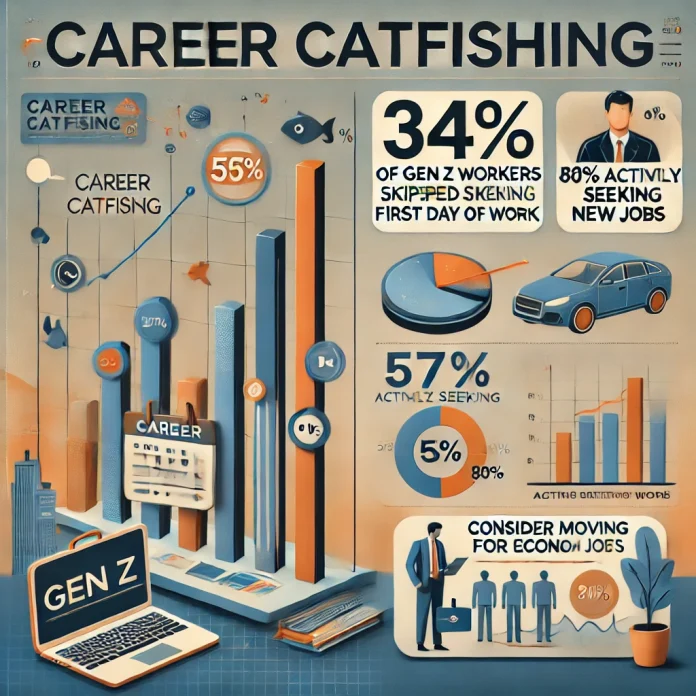A surprising new trend has begun to change the recruitment landscape a career path known in industry parlance as “career catfishing,” which is said to be on the rise among some 34% of Gen Z workers.
What is ‘Career Catfishing’?
As a survey done by CV Genius confirmed, career catfishing is defined as candidates accepting a position offer but never showing up for work.
The approach is gaining favor among younger generations, who are looking for more control of their careers and work-life balance.
In a survey of 1,000 employees from the U.K., nearly three-quarters (74%) of employers agreed that ghosting has become common in the recruitment process: ignores are switching into a perceived inside joke.
The Generational Shift: Why Career Catfishing Is Popular Among Gen Z and Millennials
Ghosting in the Recruitment Process
However, four in five members of Generation Z (80%) and three out of four Millennials (76%) have already moved on or would consider moving for economic reasons.
In comparison, 64% of Gen X workers and 38% of Baby Boomers reported similar trends, showing a more generational shift in candidacy behavior regarding economic pressures.
A far greater percentage of Gen Z and millennials indicated that they felt free to pursue higher-paying opportunities rather than their Boomer and Gen X counterparts.
Economic Motivations Driving Job Changes
57% of Gen Zers and 53% of millennials actively seek new jobs. In comparison, 45% of Gen X actively do while 22% do so as Boomers.
Also read: 50 Gen Z Slang Words That Instantly Make You Sound Cooler
Work-Life Balance: Gen Z’s Perspective
According to researchers based in the UK, their survey of 1,000 employees across age groups found that in particular, the workers from Gen Z reported using their clever ways to put themselves first before their jobs.
Skipping the First Day of Work
34% of Gen Zers admitted that they had skipped their first day of work without informing their employers as proof of disobedience. This behavior is a working response to all the frustration of the long job search that comprises applications, interviews, and the waiting period accrued by the hiring manager. Through career catfishing, Gen Z workers are trying to turn the power back on themselves, the job seekers.
Comparisons Across Generations
But that generation isn’t the only one doing this. Millennials between the ages of 28 and 43 admit to doing this as well, with 24% doing so. However, among Gen Xers (ages 44 to 59), just 11% of workers say they have practiced this tactic, while only 7% of the baby boomers age 60 or older have jumped on this bandwagon.
Related Trends: Quiet Quitting and Coffee Badging
For Gen Z, their self-interests and well-being seem to take precedence over traditional corporate demands. This way of thinking aligns with other developments in modern workplace culture, including so-called “quiet quitting” — putting in only the bare minimum while at work — and “coffee badging,” in which employees show up just long enough to grab a coffee, swipe their badges, and then proceed to work remotely.
The Rise of Ghosting Culture in Recruitment
The rise in such behavior cannot be attributed solely to Gen Z.
How Younger Workers View Ghosting
Office ghosting occurs when one party finds another to have cut off any communication with them without notice. An Indeed survey from 2023 reports that three out of four UK employees confessed to disappearing from a potential employer during the hiring process.
These actions are viewed by younger workers as exercising a measure of control over their careers, as highlighted by an article in Fortune.
Key Reasons Behind Ghosting Employers
According to research done by Monster, over a third of candidates who ghosted recruiters noted it was because they found the recruiter rude or had misrepresented the job role. Similarly, those applicants without degrees tended to ghost an employer during the hiring process when a hiring manager did not respond in what they considered a timely manner.
Also read: Popular Gen Z Hobbies Reflecting A New Value System
Why Career Catfishing May Backfire
For Gen Z, getting a steady, full-time job is turning into a tough climb. Fortune reports that the graduating class of 2025 has a higher chance of applying for more jobs than previous classes, with a 24 percent rise in job applications compared to last year.
But although the competition is rising, the job market is still bleak. The open positions have sharply declined since 2023, making the hiring markets even tougher to navigate.
This fiercely competitive landscape may lead Gen Z candidates to accept the first offer they receive, only to view that decision later as ill-placed and not to show up on day one.
But while career catfishing feels like a short-lived triumph, it could carry long-term risks.
Gen Z employees are already facing the negative conceptions among employers. A Resume Builder report stated that hiring managers frequently perceive Gen Z to be the generation that offers the hardest time working.
The reasons given by bosses and managers for their poor performance were entitlement, mis-motivation, lack of effort or productivity. Some others even continuously referred to them as the snowflake generation since they felt too easily offended which was an additional reason for the termination.
Engaging in such practice cements these stereotypes in such a way that it becomes more difficult for a young professional to build trust with potential employers.
Also read: Gen Z vs. Millennials – Differences & Characteristics: Who Will Lead the Future Workforce?
Addressing the Root Causes: Improving the Recruitment Process
The trend illustrates some deeper flaws within the hiring process itself. There lie several aspects and factors such as lack of communication, and mutual respect between the parties involved in the hiring process which can curb such behavior.
If better communication, timely feedback, and accountability were enhanced with both sides, they could nip the rift between them in the bud, leading to a certain level of professionalism in the hiring process for the jobs that were advertised.








